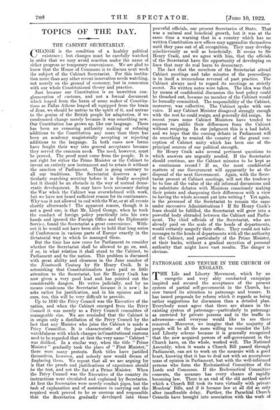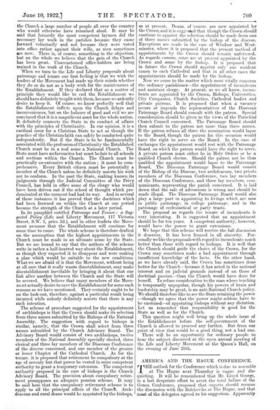PATRONAGE AND - TENURE IN THE CHURCH OF ENGLAND. T HE Life
and Liberty Movement, which by an energetic and very ably conducted campaign inspired and secured the acceptance of the present system of partial self-government in the Church, has now turned its attention to patronage and tenure. It has issued proposals for reform which it regards as being rather suggestions for discussion than a detailed plan. Everybody must agree that there are abuses in the existing system of patronage—particularly in patronage as exercised by private persons and in the traffic in advowsons—and everyone would like to see these removed. Moreover, we imagine that the majority of people will be all the more willing to consider the Life and Liberty scheme because it is generally recognized that the new acquired powers of self-government in the Church have, on the whole, worked well. The National Assembly, when it wants a Church Bill passed through Parliament, can set to work on the measure with a good heart, knowing that it has to deal not with an amorphous mass of opinion in Parliament, but with the well-informed persons who form the Ecclesiastical Committee of the Lords and Commons. If the Ecclesiastical Committee consents, the measure has every chance of rapidly becoming law. There is an end of the old method under which a Church Bill took its turn virtually with private Members' Bills, and if it became law at all did so only after insufferable delay. Further, the Parochial Church Councils have brought into association with the work of the Church a large number of people all over the country who would otherwise have remained aloof. It may be said that formerly the most competent laymen did the necessary lay work in the parishes because they came forward voluntarily and not because they were voted into office rather against their wills, as men sometimes are now. There is, of course, something in the objection, but on the whole we believe that the gain of the Church has been great. Unaccustomed office-holders are being trained in the work of the Church.
When we turn to the Life and Liberty proposals about patronage and tenure our first feeling is that we wish the leaders of the Movement had made up their minds whether they do or do not as a body wish for the maintenance of the Establishment. If they declared that as a matter of principle they would like to end the Establishment we should have definitely to split with them, because we ardently desire to keep it. Of course, we know perfectly well that the Establishment inflicts upon the Church delays and inconveniences, but on the balance of good and evil we are convinced that it is a magnificent asset for the whole nation. It definitely connects the State in its conduct of affairs with the principles of Christianity. In our opinion, it is a cardinal error for a Christian State to act as though the practice of the Christian faith can safely be conducted quite independently. But if the State is to be fundamentally associated with the profession of Christianity the Established Church must be in a real sense a National Church. The State must have no favourites but must be fair to all schools and sections within the Church. The Church must be practically co-extensive with the nation ; it must be com- prehensive. Every British citizen must be potentially a member of the Church unless he definitely asserts his wish not to conform. In the past the State, making known its judgments through the Judicial Committee of the Privy Council, has held in office some of the clergy who would have been driven out if the school of thought which pre- dominated at the moment had had its way. And in several of these instances it has proved that the doctrines which had been frowned on within the Church at one period became the strength of the Church at a later period.
In its pamphlet entitled Patronage and Tenure : a Sug- gested Policy (Life and Liberty Movement, 117 Victoria Street, S.W. 1, price 3d.), and in other leaflets the Move- ment assumes that the Establishment will continue for some time to come. The whole scheme is therefore drafted on the assumption that the highest appointments in the Church must be made in an ultimate sense by the State. But we are bound to say that the authors of the scheme write in rather a half-hearted way about the Establishment, as though they expected it to disappear and were making a plan which would be suitable to the new conditions. What we are afraid of is that the Movement, without being at all sure that it really wants disestablishment, may make disestablishment inevitable by bringing it about that one link after another between the Church and the State will be severed. We believe that many members of the Move- ment actually desire to save the Establishment for some such reasons as we have mentioned. They certainly ought to be on the look-out, therefore, against a particular result being incurred while nobody definitely asserts that there is any such intention.
The scheme of procedure suggested for the appointment of archbishops is that the Crown should make its selection from three names submitted by the Bishops of the National Assembly. The suggestion with regard to bishops is similar, namely, that the Crown shall select from three names submitted by the Church Advisory Board. The Advisory Board would consist of two archbishops, twelve members of the National Assembly specially elected, three clerical and three lay members of the Diocesan Conference of the diocese concerned, and one member of the greater or lesser Chapter_ of the Cathedral Church. As for the tenure, it is proposed that retirement be compulsory at the age of seventy but that power be vested in some competent authority to grant a temporary extension. The competent authority proposed in the case of bishops is the Church Advisory Board. The provision about compulsory retire- ment presupposes an adequate pension scheme. It may be said here that the compulsory retirement scheme is to apply to all the principal offices of the Church. Arch- deacons and rural deans would be appointed by the bishops, as at present. Deans, of 'course, are now appointed by the Crown, and it is suggested that, though the Crown should continue to appoint the selection should be made from one of three names submitted by the bishop of the diocese. Exceptions are made in the case of Windsor and West- minster, where it is proposed that the present method of appointments by the Crown should remain unfettered. As regards canons, some are at present appointed by the Crown and some by the bishop. It is proposed that in future the Crown should appoint only one resident canon to each Cathedral and that in all other cases the appointments should be made by the bishop. Now we come to the matter which most vitally concerns the ordinary parishioner—the appointment of incumbents and assistant clergy. At present, as we all know, incum- bents are appointed by the Crown, Bishops, Universities, City Companies, Church Societies, Cathedral bodies and private patrons. It is proposed that when a vacancy occurs or impends the representatives of the Diocesan Patronage Board should consult with the patron. Special consideration should be given to the views of the Parochial Church Council concerned. The Patronage Board should then submit to the patron not more than three names. If the patron refuses all three the nomination would lapse to the Board, though the patron for this occasion would have the right to serve on the Board. In the case of exchanges the appointment would rest with the Patronage Board, on which the patron would have the right to serve. A private patron must either be in Holy Orders or be a qualified Church elector. Should the patron not be thus qualified the appointment would lapse to the Patronage Board. The Diocesan Patronage Board would consist of the Bishop of the Diocese, two archdeacons, two priests members of the Diocesan Conference, two lay members of the Diocesan Conference, and three lay members, com- municants, representing the parish concerned. It is laid down that the sale of advowsons is wrong and should be made illegal. The Diocesan Patronage Board would also play a large part in appointing to livings which are now in public patronage, in college patronage, and in the patronage of ecclesiastical or party trusts. The proposal as regards the tenure of incumbents is very interesting. It is suggested that an appointment should be for ten years. A competent authority, however, would have the power to grant extensions.
We hope that this scheme will receive the full discussion it deserves. It has been frained in all sincerity. Per- sonally we like the proposals with regard to incumbents much better than those with regard to bishops. It is well that the Church should guide the choice of the Crown, for the Crown may sometimes make a bad appointment through insufficient knowledge of the facts. On the other hand, as we have already said, the Crown has sometimes done better for the Church—because it has acted in the national interest and on judicial grounds instead of on those of doctrinal passion—than the Church would have done for herself. To refuse consideration to the man whose teaching is temporarily unpopular, though his powers of brain and leadership may be great, is an anti-National Church policy. We should therefore like to see the State retaining the power —though we agree that the power might seldom have to be exercised—of appointing bishops without any dictation. Let us remember that responsibility is good for the State as well as for the Church.
This question might well bring up the whole issue of the Establishment before the self-government of the Church is allowed to proceed any further. But from our point of view that would be a good thing, not a bad one. There will be an opportunity for ordinary people to hear the subject discussed at the open annual meeting a the Life and Liberty Movement at the Queen's Hall, on the evening of June 26th.



































 Previous page
Previous page